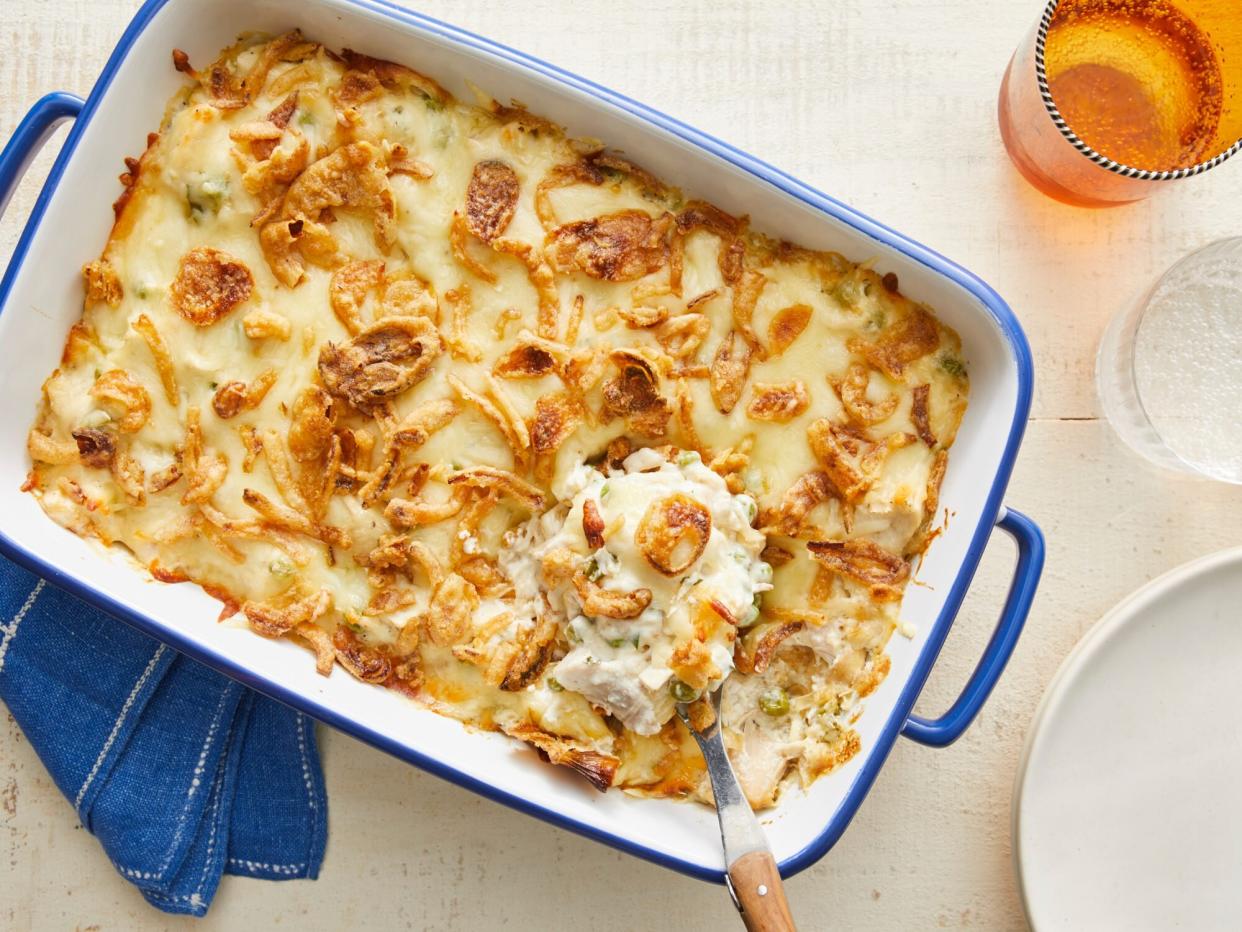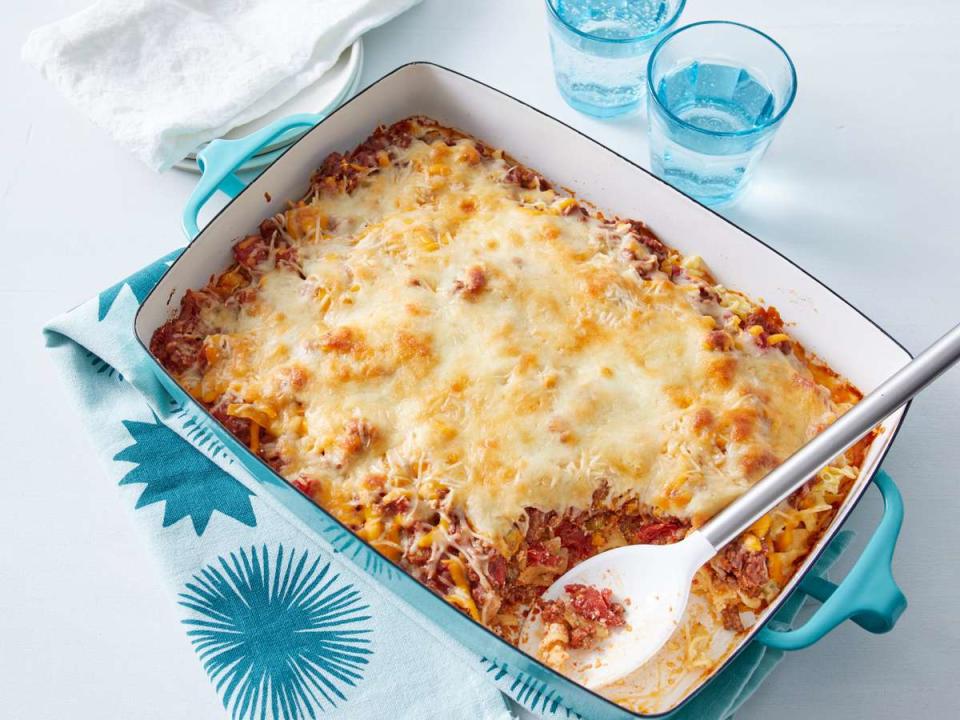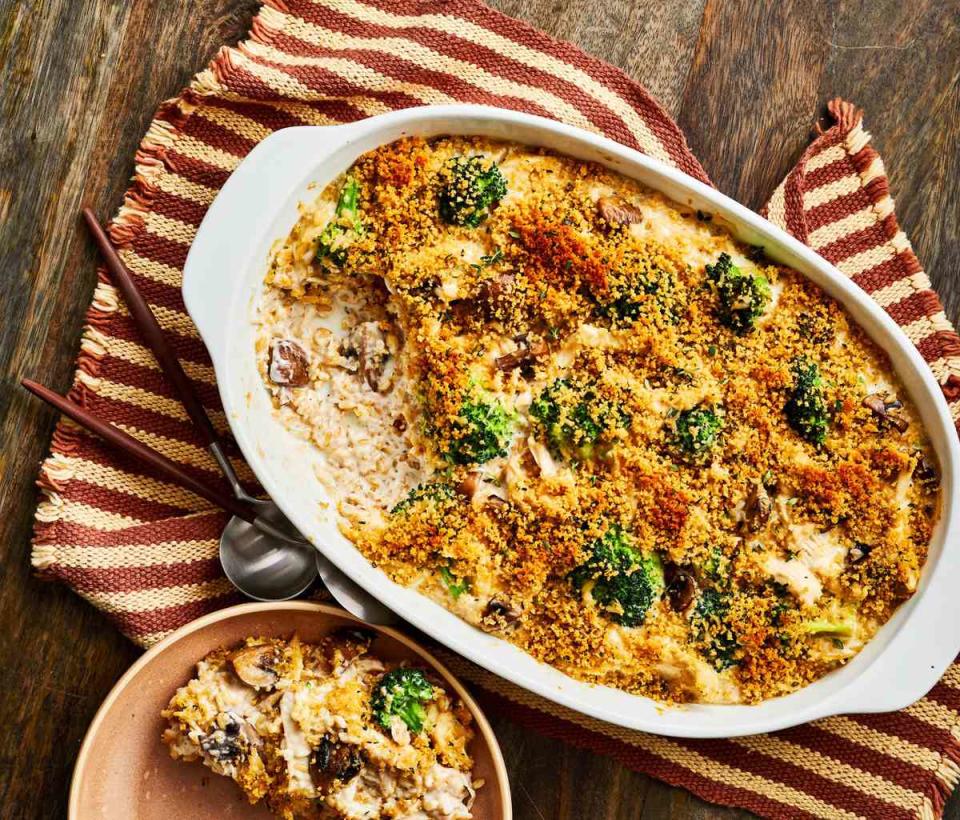What Makes A Casserole A Casserole?

Stacy Allen; Food Stylist: Karen Rankin; Prop Stylist: Lindsey Lower
Few dishes have a closer link to Southern home-cooking traditions than the casserole. Recipes, ingredients, and methods vary from kitchen to kitchen, but the idea of mixing different food items, baking in a deep and sturdy dish, and serving to friends and family is near and dear to many Southerners' hearts.
Although casseroles are common and well-loved in American kitchens, it can be challenging to define exactly what constitutes a "casserole." Which ingredients need to be present? Which cooking methods are non-negotiable? Does any layered dish fall into the "casserole" category, or are casseroles more specialized?
What Is a Casserole?
Executive chef Rob McDaniel of Helen in Birmingham, Ala., describes a casserole as a dish that "needs to be HOT and something you scoop with a spoon to serve; a casserole is a one-dish meal."
Executive chef Kristin Beringson of Henley in Nashville fine-tunes this definition as follows: "A casserole is a preassembled baked entrée [that's] served in the same dish that it is cooked in. Casseroles are usually made with a binding element, like dairy, that is incorporated throughout the dish—think heavy cream, milk, or butter. Other times, it could be a roux-thickened sauce, like gravy, that binds the dish together. A casserole, to me, is more mixed together and less layered, but it can be either. There can really be any combination of ingredients and flavors, but all are usually baked in the dish they are served in."
Read on for more insights from Southern chefs on what defines a casserole, the role that casseroles play in Southern culinary culture, and why casseroles will never fully go out of style.

Will Dickey
Get the Recipe: Homestyle Ground Beef Casserole
Casseroles and "Southern Hospitality" Go Hand-in-Hand
When we asked Texas-based chef/restaurateur (and "Top Chef" alum) Tiffany Derry about the connection between Southern hospitality and casseroles, she told us that casseroles "are the epitome of comfort food, and there is plenty of comfort in Southern cuisine. Growing up in the South, casseroles were a staple around my family's supper table. They are warm dishes rich with flavor, texture, and soul. Casseroles are a simple way to feed a big group and are great for leftovers the next day."
Executive chef Alex Harrell of Commons Club at Virgin Hotel New Orleans also points out the significance of casseroles for important events in Southern culture, telling us that they are "one of the ultimate extensions of Southern hospitality. It's how we take care of one another. From family holiday celebrations to bereavement gatherings after a loved one passes. Whenever Southerners get together, you'll find casseroles on the table."
Casseroles Are a Prime Example of Low-Waste Cooking
One of the most notable benefits of casseroles involves the ability to make excellent use of extra produce, spare cuts of meat, and leftover foods.
"Casseroles can be a whole family dinner and can be made inexpensively. They are often made of vegetables or meats that are already on hand or due to a bumper crop from the farm, which is what I use them for," explains executive chef Derek Dollar of Milton's Cuisine and Cocktails in Milton, Ga.
Chef/owner Kevin Gillespie of Red Beard Restaurants in Atlanta (who was a "Top Chef" runner-up) speaks to the potential of casseroles for low-waste cooking, saying that "casseroles are driven by utility [as] a way to use up ingredients [and are] favored by those in rural areas, like [much of] the South. A casserole is about taking small amounts of expensive ingredients and making them go further or taking leftovers and making them into something new. Their value is in transforming one meal into another. The goal is usually economical, but with a desire to make something delicious."
Casseroles Are Largely Defined by Their Baking Dish
Our chef sources generally agree that casseroles can include any number of different ingredients, but in order to be considered a "casserole", a dish needs to be prepared in a specific type of cooking vessel. "The thing that distinguishes a casserole from any other layered dish is the type of baking pan used to cook it," insists Atlanta-based chef and cookbook author Bryant "Baul" Williams.
Executive chef Dustin Willett of The Brown Hotel in Louisville, Ky. agrees, telling us that "a casserole is baked in a casserole dish—a deep baking dish. The word casserole comes from a French word meaning 'saucepan.'"

Victor Protasio; Food Styling: Rishon Hanners; Prop Styling: Audrey Davis
Get the Recipe: Mushroom and Thyme Chicken-Broccoli Casserole
Casseroles Typically Include Certain Ingredients
But the beauty of a casserole at least partially relies on its flexibility; you should be able to incorporate any number of ingredients in this style of dish.
That said, chef/restaurateur Ashley Christensen of Poole's, Poole'Side Pies, Death & Taxes, and Beasley's in Raleigh, N.C. lays out a clear (but adjustable) breakdown of what a casserole should include: "I hesitate to be too dogmatic here, since I think the genre is flexible, but generally, for me, a casserole consists of ingredients mixed in a bowl, and then transferred to a baking dish. In my family, there is usually a creamy element—a béchamel, or a cream of soup, or sour cream—and then vegetables or protein, or both. There is almost always a topping layer—buttery crushed Ritz crackers, or crunchy fried onions, and even crushed up potato chips—that provides a crispy crust-like experience to complement the creamy nature of the casseroles center. There is almost always some presence of cheese."
So what ultimately is a casserole? It's kind of whatever you want to be—as long as it's made in a casserole dish, it seems.

